"There Are Many Roadblocks to Skateboarding in Palestine, Physically and Metaphorically." — An Interview with SKATEPAL
SKATEPAL's founder shares how they helped grow the Palestinian skateboarding scene.
This is an interview with Charlie Davis, the founder and director of SKATEPAL. Founded in 2013, SKATEPAL promotes youth skateboarding in Occupied Palestine by building skateparks, teaching classes, and funding the local skate scene. Charlie and I discuss what inspired him to start SKATEPAL, how they’re navigating this difficult period, and why it’s crucial to spread joy to oppressed communities.
Enjoy! — Joe
Joe Wrote: Charlie, thank you for being here today. Can you start by telling the audience about SKATEPAL? What is your mission? What kind of work do you do?
Charlie Davis: Our tagline is 'Supporting Young people in Palestine through Skateboarding.’ Our mission is to create a skateboarding scene in Palestine. When we started, there was essentially no skating at all. We wanted to introduce the sport so it could grow organically and wouldn’t rely on outside help. And that's what we're still doing. We teach classes, bring in skaters from around the world, build skate parks, and do everything possible to promote skateboarding. Ultimately, it's about creating a self-sustaining community so that if something were to happen to us or SKATEPAL ceased to exist, skateboarding could still flourish in Palestine.
JW: What inspired you to start SKATEPAL? Did you have an experience or hear a story that put the idea in your head?
CD: After graduating from school, I went to Palestine to volunteer at a youth center, and I brought my skateboard with me. I was quite young, 19, and it was my first time on my own in a small village in the Middle East. But the local kids were really interested in my board and skating. I didn't have any plans of doing anything like SKATEPAL at the time. But during that initial trip, I saw the kids’ excitement, and I thought it was a shame that they didn’t have access to skateboarding because I'm sure it would take off.
Later, I studied Arabic at the University of Edinburgh. Skateistan1 sprang up as I was finishing my degree. This guy, Ollie from Australia, was bringing skateboarding to Afghanistan. If he were doing it there, then I could try to do it in Palestine. That was the spark that eventually turned into SKATEPAL.
JW: You said you hadn't thought much about the Middle East before you graduated from school. What led you to volunteer in Palestine as a 19-year-old? That's certainly a unique experience for someone of such a young age.
CD: My mum worked in a church in Edinburgh, and they were supporting a community center in Jenin, which is in the West Bank. They needed a volunteer to teach English and music, so I decided to go. This was in 2005, towards the end of the Second Intifada. It was hectic, and a lot was happening on the streets. But it was a great experience to be in a town where you don't speak the language and you’re the only one not from there. It was truly immersive. I kept going back to Palestine, and I brought some of my Arabic classmates.
JW: What is it about skateboarding that you see as a beneficial social tool? SKATEPAL brings in skaters from other countries, much like a cultural exchange program. What do you think it is about this sport that makes it valuable to a community in crisis, like Palestine?
CD: First is the mental aspect. Skating requires focus, which takes your mind off all the other stresses in life. It’s also quite challenging, which leads skaters to become resilient and develop problem-solving skills. Skateboarding is hard, but the reward is high. It’s not so much about competing against someone else, but competing against yourself to see what you can achieve. You can also skate in a group or on your own, which is a unique advantage over other activities.
Then there’s the cultural aspect. Skateboarding is a niche sport across the globe, so if you meet a skater from the other side of the world, you'll immediately have something in common. You might be from different cultures, but you’ve seen the same skate videos, know the same professionals, and have a shared cultural frame of reference. Because everyone's on social media, skaters from different countries are connected around the same activity. I feel that skateboarding is typically counter-culture, so skaters tend to be more creative and progressive. I haven’t run into any super conservative, anti-Arab racists or staunch Zionists. Maybe there are some, but not many.
JW: So what you’re saying is, Tories don't skate?
CD: (Laughs)I haven't asked everyone's political allegiance, but I would hazard a guess so.
JW: I haven't skated since I was a kid, but I live across from the Denver skatepark, which I’ve been told is notable. It's really cool to see skateboarding brings different types of people together. The park is filled with families, kids, and older people, and pros show up just to hang out. Last spring, Tony Hawk’s kid was graduating from a nearby college, so he was just skating with people on a Tuesday afternoon. From an outsider’s perspective, it seems like an activity with a low barrier to entry that promotes social cohesion.
You touched on it earlier, but what did the first decade of SKATEPAL look like? You were founded in 2013. Obviously, things changed in 2023. But prior to the escalation of the genocide, were you going to build skate parks in Palestine? Were you sending them money? How did you recruit skaters to go there and teach classes?
CD: The first project was me, my brother, and two mates building small wooden ramps at a summer camp. We started giving classes, and that’s when we met our current local manager, Aram Sabbah. He’d just turned fourteen, and a Lithuanian guy who'd arrived randomly gave him his board a month before. He saw us building a ramp and asked, “What the fuck are you doing? No one skates here.” We told him he could start skating and join our crew.
So the beginning was very DIY. We just went to Palestine, built ramps, and taught classes. By that point I spoke Arabic, so I hung out with the kids and their families. I thought the stronger the relationship is between us and them, the more they'll trust us and the more the kids would participate.
As the classes grew, other local groups and councils asked if we could build them a ramp or a park. So, once I saw there was interest in it, I thought, 'If I'm going to be doing this a lot, I should probably register this as an organization.' So that’s when SKATEPAL officially began. Someone suggested we start building concrete parks. The first one didn’t go great, but it was a stepping stone to where we are now.
We built the Asira skate park in 2015, which remains the most frequently used park we have. That’s when I met Theo, our other director. He improved our social media and website, so our online presence grew and drew skaters to volunteer. SKATEPAL expanded rapidly after that, which really helped build the Palestine skate scene organically. To have a real community, you need to have skaters on the ground there all the time. The goal was always to reach a point where we wouldn’t have to rely on volunteers, and people would take it up on their own. We got there in 2023, and started working with a local group called Skateboarding.PS. It’s run by a local skater who came up skating our parks. Now he’s got his own organization with local volunteers who run classes. So we basically coordinate with him and raise money through our online shops. The focus is primarily on funding local organizations that work to improve their own communities.
The SKATEPAL team at the Asira Al-Shamaliya skatepark in 2015.
JW: That's very cool. You began this conversation by saying the mission was to build a skate scene in Palestine. It sounds like you've done that!
CD: Yeah, the most exciting moment was formerly partnering with Skateboard.PS and seeing him take the mantle and move forward. We still encourage people to visit, but just not in the sort of NGO, volunteer charity banner. We encourage them to go to skate and be a tourist there and meet Palestinians on an equal level. It's still a fairly nascent scene, and it's quite small because many of the older skaters leave to study or work abroad. Which is understandable, as life there is pretty tough. But now it's great that there are enough older skaters who want to hang around and actually build something. I'm really proud to have reached the point where we no longer need volunteers to be effective.
JW: As you mentioned, things really changed in October of 2023. What kind of work is SKATEPAL doing now for Palestinians, given the terrible circumstances?
CD: For the first six months, no one was skating; people thought it was inappropriate to have anything fun when the war was happening in Gaza. We focused on driving donations to relief organizations. After a while, we realized circumstances wouldn’t dramatically improve, so the local team started teaching lessons again. Those of us in the UK focused on the online shop because that’s the easiest way for us to raise money without relying on grants, which are somewhat risky.
The new plan for us, at least for now, is to start generating more income in the UK and sending it to Palestine for the locals to develop their own organizations. That's essentially how we responded to the violence. SKATEPAL was always intended to get things going, then step back, raise funds, and let the Palestinians lead. We're going to focus on making enough money to support them without having to apply for grants.
JW: I found SKATEPAL through Instagram, as I believe you were tagged by your other partner organization, the Gaza Skate Team. What does your collaboration work with them look like at this moment? It’s surprising given their circumstances, but they do post a lot on Instagram, and it looks like they are still running skateboarding classes, despite the decimation of Gaza’s entire infrastructure. How is SKATEPAL supporting them currently?
CD: I’ve known Raj, the Gaza Skate Team leader, digitally for many years. But I've never met him because I've never been to the Gaza Strip, and he can’t come out because you’re not allowed to go back and forth. That’s why SKATEPAL worked mostly the West Bank, because we could physically get there. But when we pivoted to funding, we began raising money for those in Gaza.
So, in the past, we helped Raj get cameras and boards through the blockade. He’s doing as much work as he can with the kids to try to raise morale. We stay connected and fund him anyway he can so he can keep providing for Gazan children.
At the same time, we were chatting with Kalani from Skateboarding.PS along similar lines. He was teaching for free previously, but we wanted to pay him. Now he's teaching classes at the skate park we built in the girls’ orphanage in Ramallah. Kilani is also trying to do his own skateboard sessions in different areas of the West Bank. But often these don't get off the ground because it's in a military zone, the army closed the area, the roads are blocked, or something else happened. There are a lot of roadblocks to Skateboarding in Palestine — physically and metaphorically.
The Gaza Skate Team’s got way more followers than we do on Instagram. They had an interview with Thrasher last month, and they had a lot of media attention, which is great. People are seeing what's going on. Eventually, we'd like to reach a stage where SKATEPAL can collaborate as equal organizations, rather than us providing all the advice, because by year two, they'll have built up their expertise and know what they're doing.
JW: Before we wrap up, one thing I really like about your organization and other similar charities is that, as you mentioned, most charitable organizations focus on humanitarian work, such as providing food, medicine, and shelter. And while that is extremely important, there’s also a desire for people who live in difficult circumstances to enjoy life, not just merely survive. Correct me if I’m wrong, but I get the sense you share this thought. What do you see as the benefit of an organization like yours, compared to another organization that delivers aid?
CD: Obviously, people need to have food, shelter, safety, and medicine to survive. But if you’re alive, you need to have something fun. You need to enjoy life. Otherwise, what's the point of living if it's just miserable all the time?
Every surviving Gazan is going to have severe PTSD to a degree we can’t relate to. However, being able to spend your time focusing on something like skateboarding, which some could argue is frivolous, is actually what makes life exciting for people. People go to work so that they can then pay the bills, get food and medicine, and do what they want to do with their lives. And so, if it's just doing all the boring stuff and then not doing anything fun with your life, then what's the point? I’ve had fun skating for decades, and I thought it’s only fair if other people have the same opportunity, no matter where they live. And their passion could be skateboarding, it could be rollerblading, it could be anything. If you don’t have anything to look forward to, it's pretty easy to lose yourself to hopelessness because there's nothing to aim for and nothing to build upon.
I’ve fallen in love with sharing my passion for skateboarding. The kids love it, which is fantastic. We’re all going to meet up again in October with Aram and Kilani in Istanbul for a work trip, where we can all meet outside of our homes and skate together. Originally, I thought it was an expense we didn’t need. But then I realized, it’s not just food and shelter that humans need. We need to unite and get motivated. Motivation comes from getting joy from what you're doing. The more we do it, the more I realize that when you look back with your friends and reflect on the things that make life worth living, it's having a purpose, feeling like people depend on you, and having fun.
JW: How can the audience support SKATEPAL, your mission, and the people you are helping in Palestine?
CD: Please follow SKATEPAL, Skateboarding.PS, and The Gaza Skate Team on Instagram. The best way to support us is by purchasing merchandise from our online shop. All the proceeds go towards keeping SKATEPAL operating. Our products represent the culture and life of Palestine. The best way you can help is to go and buy some of the stuff rather than donating. That way you get something out of it, people will see it, and you can spread the word about SKATEPAL. Additionally, we have people who organize fundraising events, many of which are specifically for the people in the Gaza Strip. If you're interested in hosting a fundraising event for us or for them, we can provide you with the necessary information to do so. Regardless of how you chose to support us, we can’t thank you enough.
Please follow SKATEPAL and its partner organizations on social media.
If you’re able to, please support SKATEPAL and Palestinian skaters by purchasing something from their shop. I bought from them previously, so I can vouch for the high-quality of the products. Also, they ship to the US.
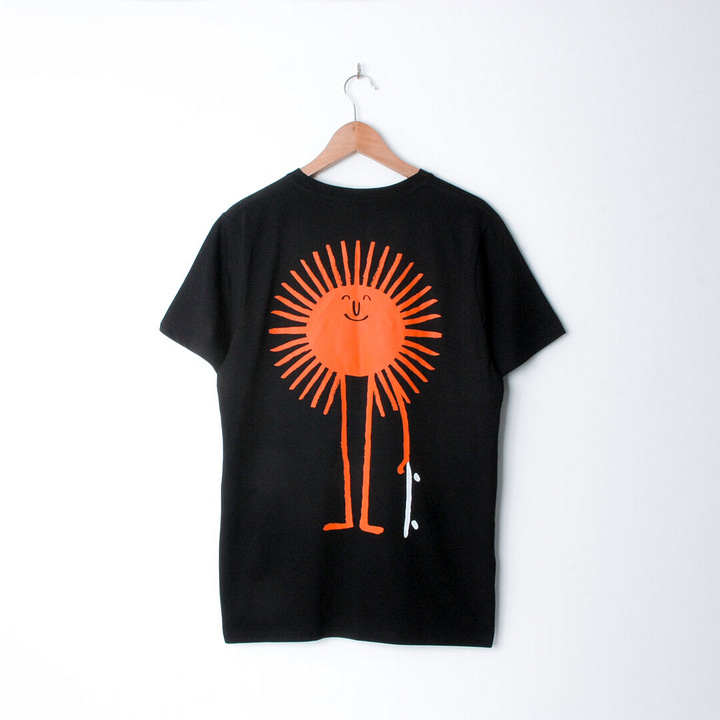
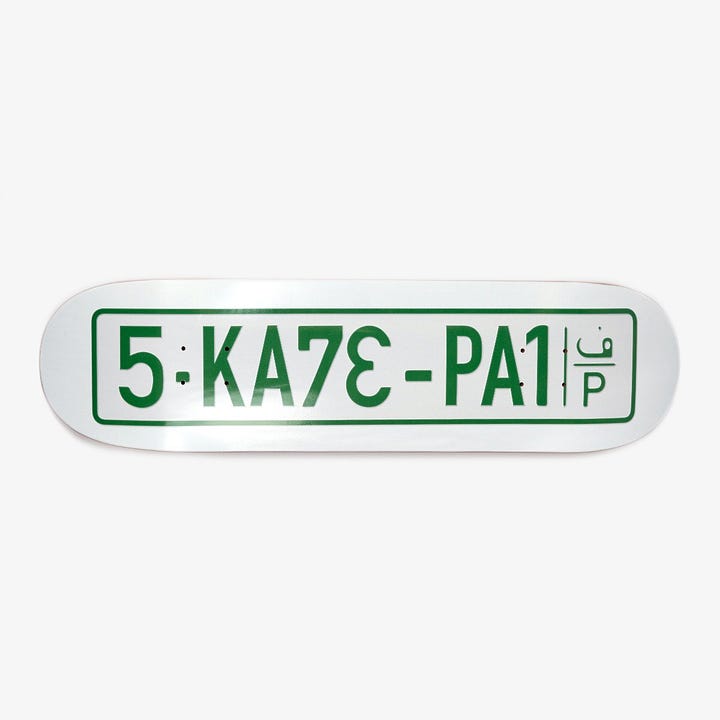
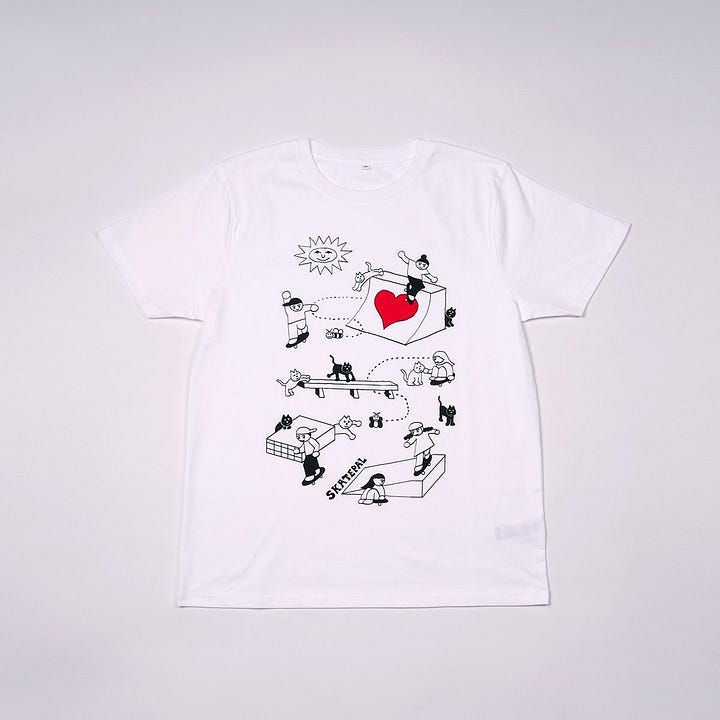
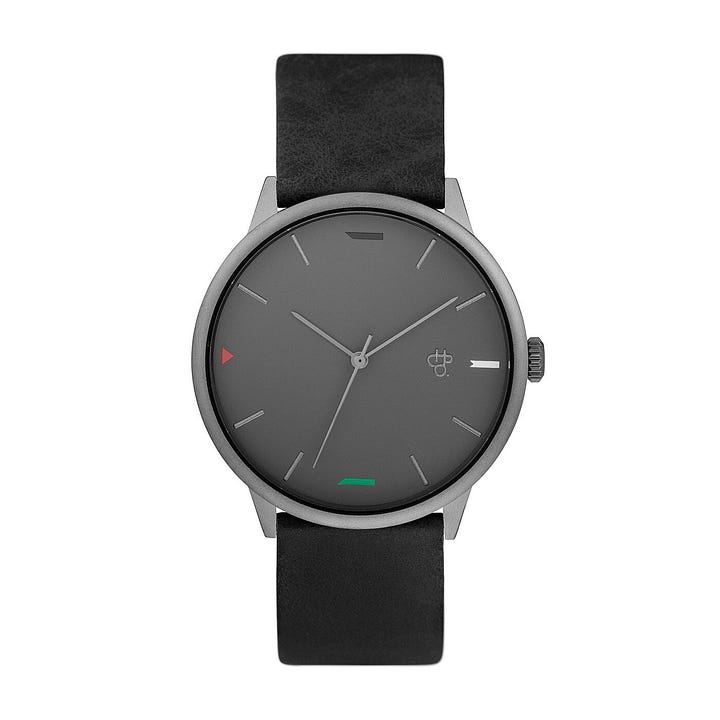
As always, please click the ❤️ and subscribe to support my work, so I can keep producing content like this interview.
In Solidarity — Joe
Skateistan is a charitable organization that promoted skateboarding in Afghanistan. It has since spread around the world.


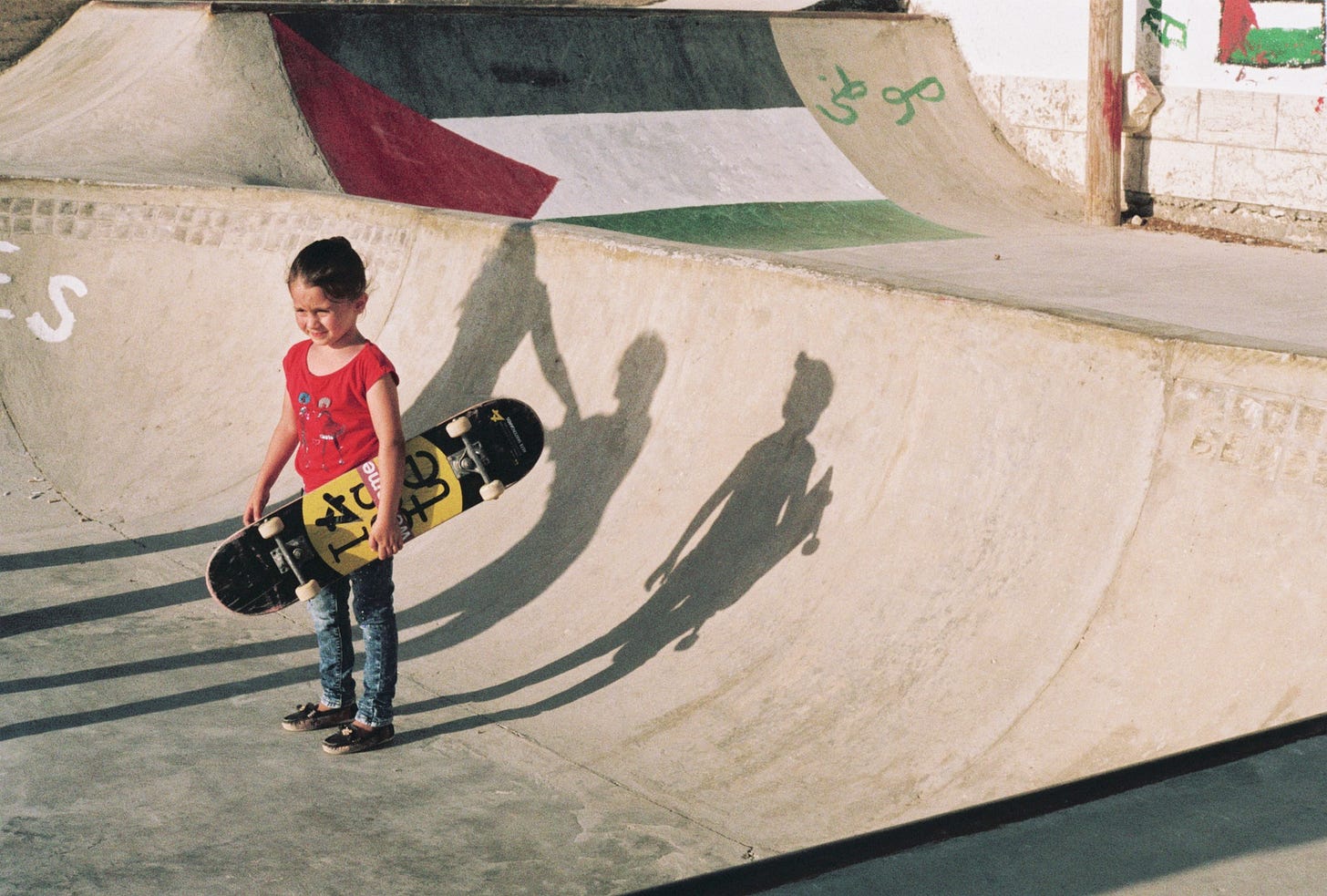
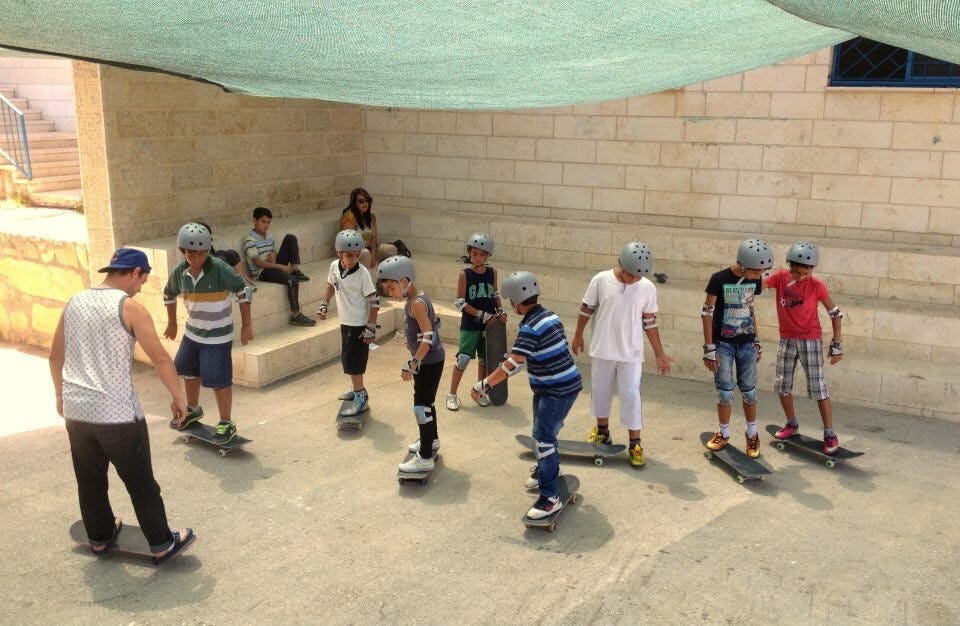
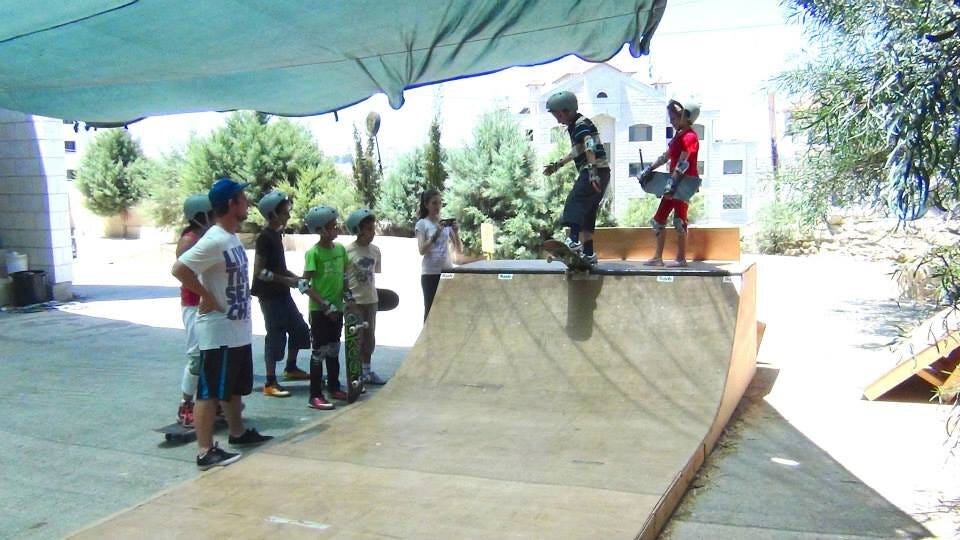
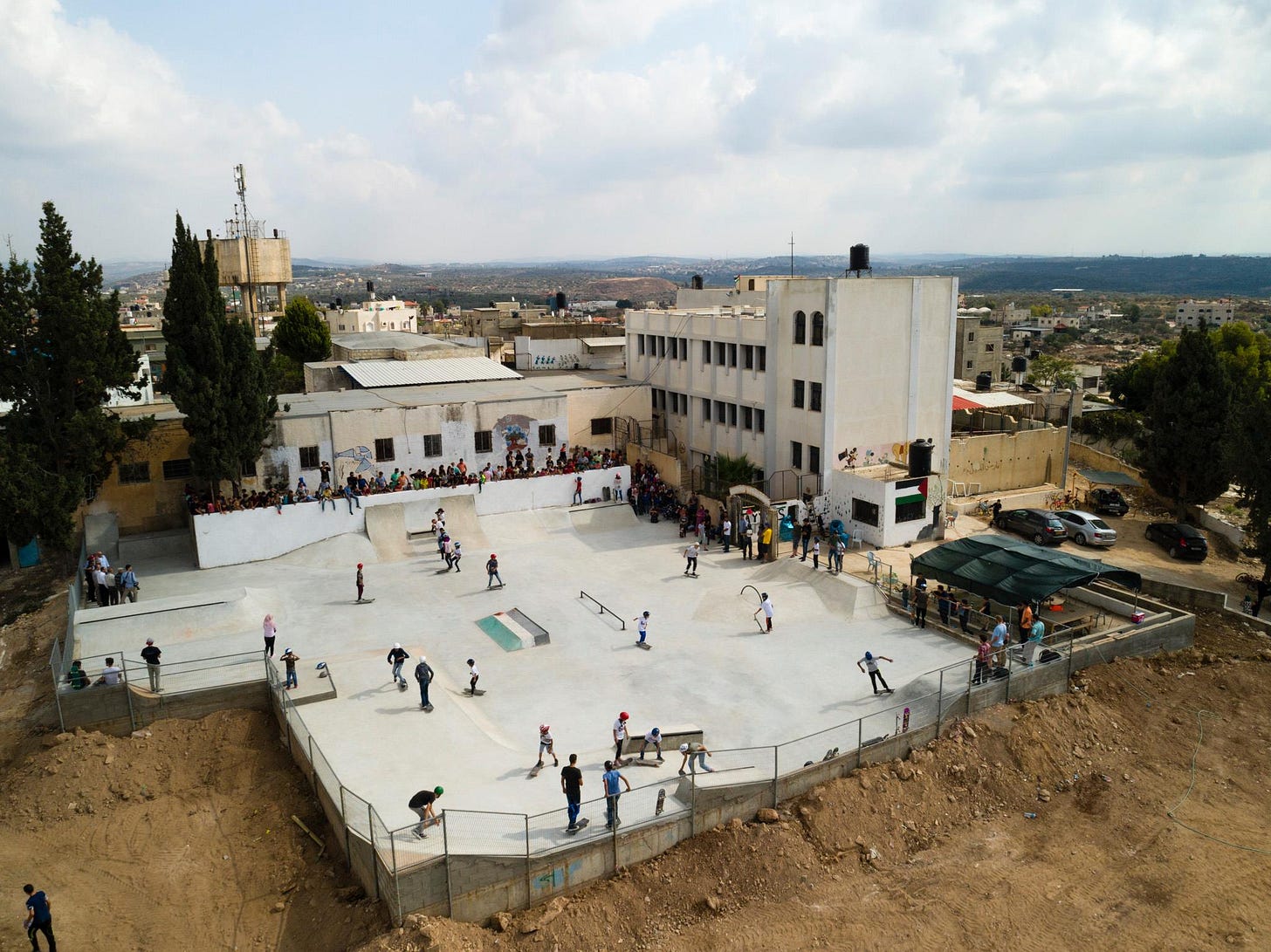
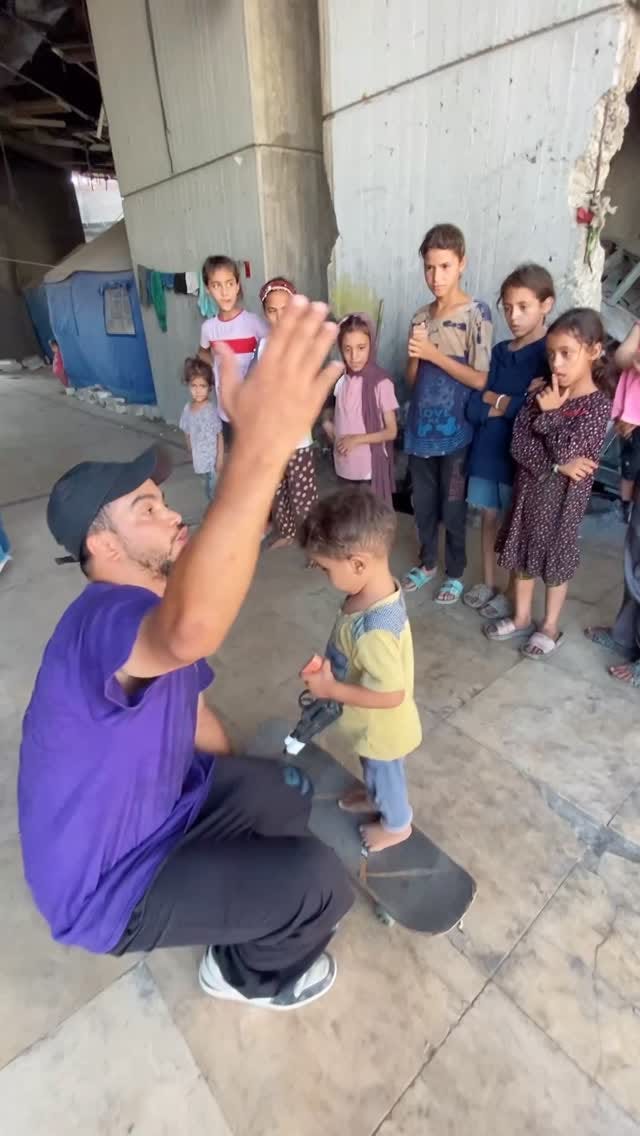

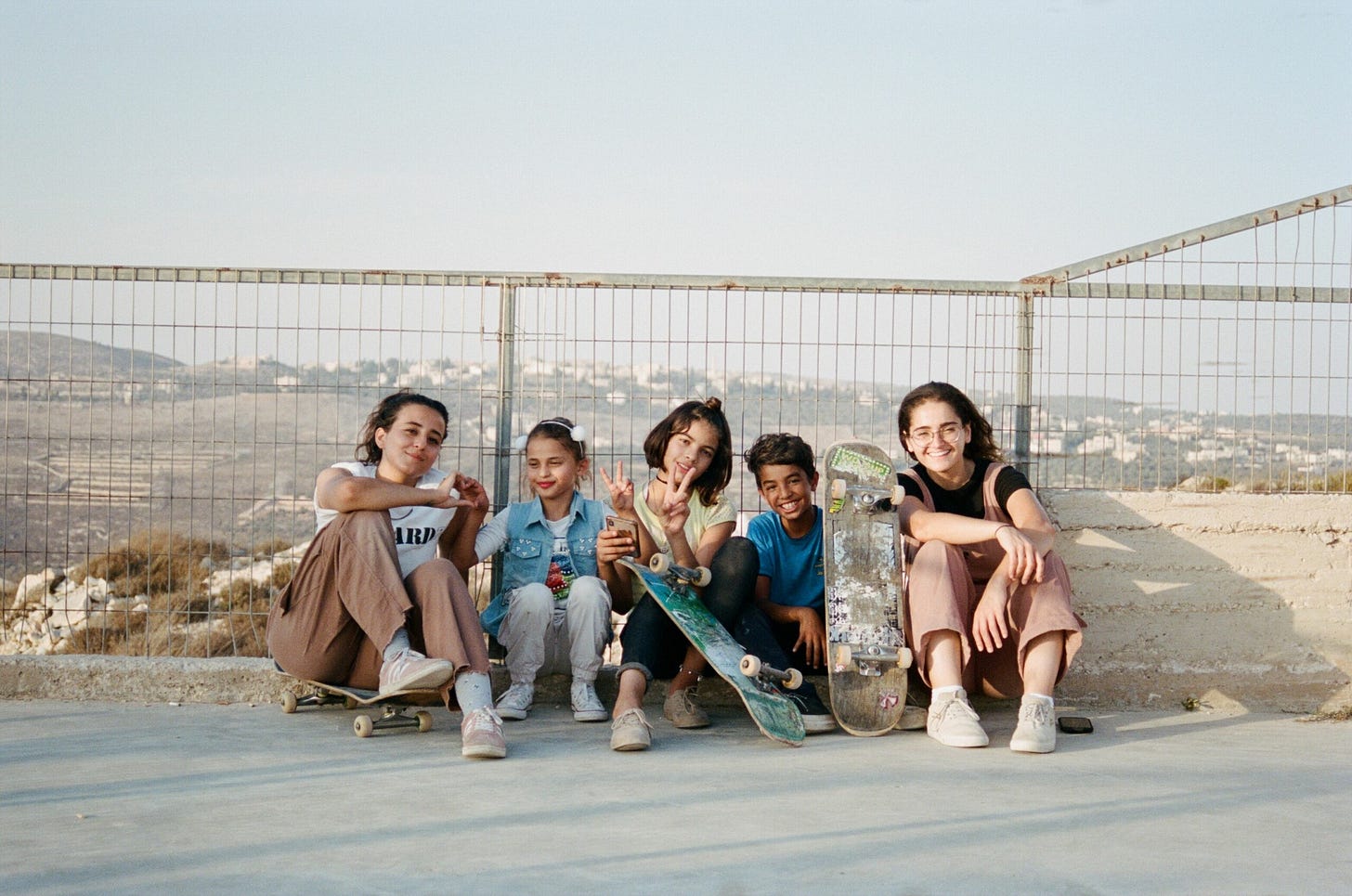
Great article! thanks